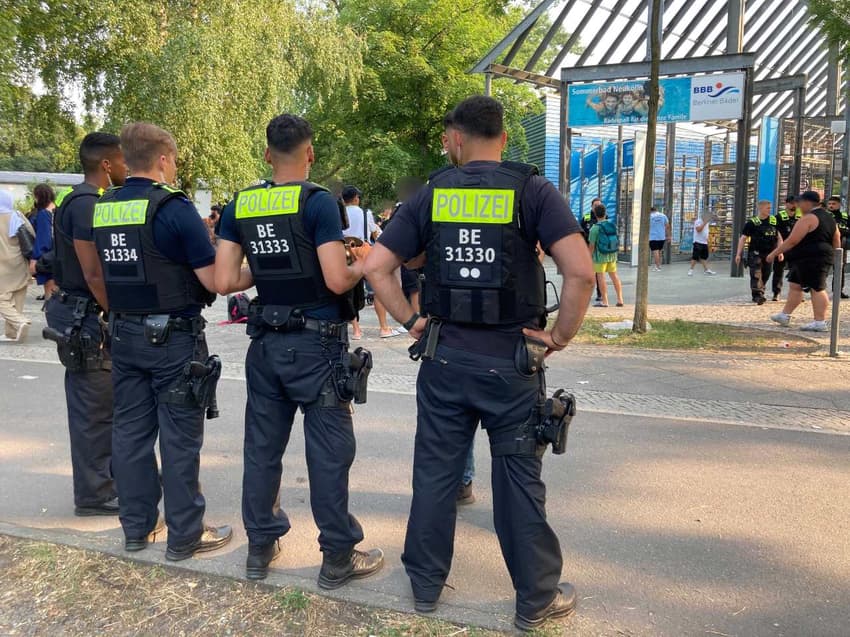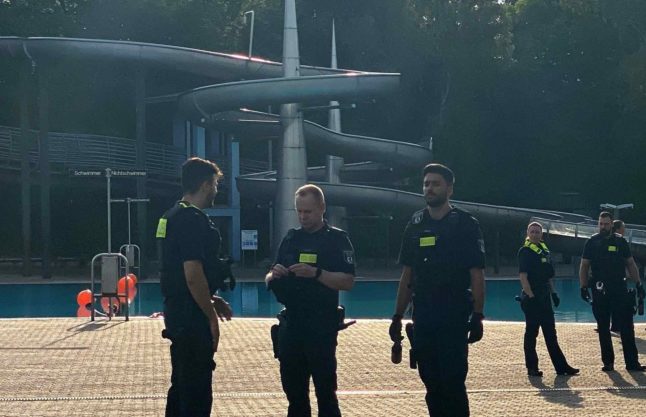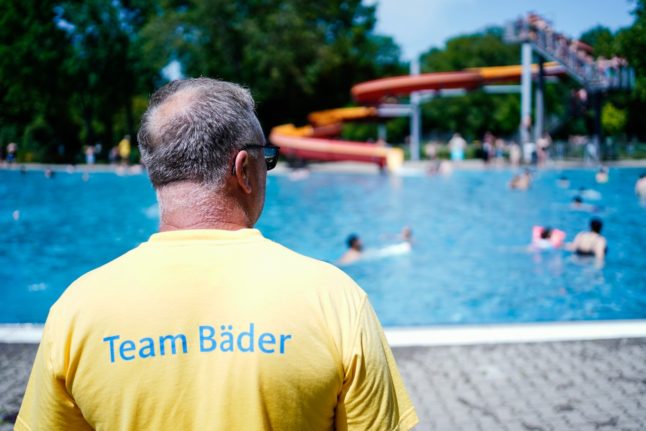Why Berlin is tightening security at open-air swimming pools

Violent clashes at open-air swimming pools in Berlin have prompted the Senate to introduce tough new entry rules this summer. What's behind the recent incidents - and should Germany be doing more to keep the public safe at pools?
In Berlin's Neukölln district, residents hoping for a refreshing dip to escape the sweltering heat last week faced bitter disappointment: Columbiabad, the district's main open-air swimming pool, was closed to visitors for a full week after numerous staff called in sick.
The background is a spate of brawls that have broken out at Freibäder recently - primarily in Berlin, but also elsewhere in Germany - that have shocked communities and led to calls for a crack-down on violence.
In Neukölln, police were forced to clear the swimming pool and close it after a fight broke out between staff and a group of young men in early July. It was the most dramatic instance of violence to have taken place at the Freibad in some time - but certainly not the only one.
Shortly afterwards, several attendants called in sick to work, with many speculating that the tense atmosphere and security fears were behind the choice to stay home. It led to the popular leisure spot closing its doors for a week in the height of summer and only reopening on Monday - with several new security measures in place.
The incident in Neukölln made for sensational headlines across Germany, with commentators speculating that the attacks on staff were linked to poor integration in the multi-cultural Berlin district. But several other districts of Berlin have also dealt with outbreaks of violence this summer.
In the more well-heeled and family-oriented district of Pankow, for example, an altercation between two lifeguards and two young men back in June ended in a mass brawl involving around 30 visitors at the pool.

Police stand around at Columbiabad after clearing and closing the pool following a violent incident in July. Photo: picture alliance/dpa | Andreas Rabenstein
In Kreuzberg, meanwhile, a man was beaten so badly at a Prinzenbad open-air pool that he lost consciousness and had to be treated in hospital. The 32-year-old had been attacked by several young men after intervening in a fight between two teenagers.
The spike in incidents this year has prompted a heated debate in Germany as commentators try to understand what's happening. Who's to blame for the seeming culture of violence at leisure facilities frequented by children and families? Or is it just a few bad apples?
In the meantime, Berlin has also toughened up the entry policies at its open-air pools, with visitors now required to show official ID or risk being turned away.
READ ALSO: How to stay safe while swimming outdoors in Germany this summer
In addition, the water slides in Pankow and Neukölln were closed to youngsters temporarily - though these have now been reopened.
On top of this, a much stronger police presence can now be seen at many of Berlin's most popular summer pools. According to reports in ZDF, mobile police teams are being stationed in Neukölln, Kreuzberg, Spandau and Pankow in the coming weeks to keep an eye on potential misbehavers.
At Columbiabad, the pool's grand reopening on Monday turned out to be a relatively quiet day. Nevertheless, four police stood on guard at the venue, their ranks bolstered by multiple security guards and at least seven pool attendants.
Does Germany have a problem with public violence?
Once branded the "capital of chaos" by Bavaria state premier Markus Söder (CSU), Berlin has something of a reputation for being an anarchic and disorderly place.
So when news broke out that multiple punch-ups had happened at the city's summer pools, it was partially met with knowing looks and weary nods from commentators elsewhere in Germany.
Writing in Welt recently, journalist Anna Kröning wondered if there were any pool operators left in Berlin "whose staff will dare to open the doors".
But while many have relished pointing the finger at the capital, there are signs that the issues at pools are a little more widespread.
In fact, in the state of Baden-Württemberg alone, there have been around 1,170 offences committed at pools this summer, according to official statistics. In Mannheim, a recent mass brawl at a public swimming pool resulted in a 24-year-old being treated for stab wounds.

A pool attendant watches over the visitors at the open-air pool in Mannheim. Photo: picture alliance/dpa | Uwe Anspach
The media debate that has kicked off in the meantime is reminiscent of the discussions that took place after attacks on police and emergency services in Berlin on New Year's Eve.
Noting an increase in violence at pools over the last decade, Peter Harzheim, president of the Swimming Pool Operators' Association, suggested that certain groups of foreigners were primarily to blame.
"Especially in the cities and large urban centres where clans have settled, we are seeing more and more violent incidents in the open-air swimming pools," he told RND. "In these cities, the outdoor pools are like a powder keg."
READ ALSO: How New Year's Eve fireworks chaos sparked a racism debate in Germany
Some have also suggested that cultural differences or a "lack of integration" are behind the violence, once again laying the blame on foreign communities - or at least those with a migration background.
But others point to the fact that the combination of sweltering temperatures, alcohol and half-naked teenagers can create an overheated atmosphere where occasional scraps take place.
Some pool staff, meanwhile, say that general levels of respect for authority have gone down over time. Attendants regularly have to deal with minor issues like spitting, verbal confrontations and flouting the pool rules, they report.
According to the police, young people's upbringings could also have something to do with it.
"The ability to resolve conflicts respectfully and without violence has reduced," Jochen Kopelke, the head of Germany's largest police trade union, told RND.
Of course, there is also the danger of extrapolating a few shocking instances to the general population and assuming that violence is widespread throughout Germany.
Even in Berlin, where at least three shocking instances have taken place recently, pool operators say the issue is down to a handful of badly behaved guests - and that these are the exception.
In short, despite the headlines, they insist that these kinds of incidents bear no relation to the fun day out that millions experience whenever they head to one of Germany's iconic summer pools.
Comments
See Also
In Berlin's Neukölln district, residents hoping for a refreshing dip to escape the sweltering heat last week faced bitter disappointment: Columbiabad, the district's main open-air swimming pool, was closed to visitors for a full week after numerous staff called in sick.
The background is a spate of brawls that have broken out at Freibäder recently - primarily in Berlin, but also elsewhere in Germany - that have shocked communities and led to calls for a crack-down on violence.
In Neukölln, police were forced to clear the swimming pool and close it after a fight broke out between staff and a group of young men in early July. It was the most dramatic instance of violence to have taken place at the Freibad in some time - but certainly not the only one.
Shortly afterwards, several attendants called in sick to work, with many speculating that the tense atmosphere and security fears were behind the choice to stay home. It led to the popular leisure spot closing its doors for a week in the height of summer and only reopening on Monday - with several new security measures in place.
The incident in Neukölln made for sensational headlines across Germany, with commentators speculating that the attacks on staff were linked to poor integration in the multi-cultural Berlin district. But several other districts of Berlin have also dealt with outbreaks of violence this summer.
In the more well-heeled and family-oriented district of Pankow, for example, an altercation between two lifeguards and two young men back in June ended in a mass brawl involving around 30 visitors at the pool.

In Kreuzberg, meanwhile, a man was beaten so badly at a Prinzenbad open-air pool that he lost consciousness and had to be treated in hospital. The 32-year-old had been attacked by several young men after intervening in a fight between two teenagers.
The spike in incidents this year has prompted a heated debate in Germany as commentators try to understand what's happening. Who's to blame for the seeming culture of violence at leisure facilities frequented by children and families? Or is it just a few bad apples?
In the meantime, Berlin has also toughened up the entry policies at its open-air pools, with visitors now required to show official ID or risk being turned away.
READ ALSO: How to stay safe while swimming outdoors in Germany this summer
In addition, the water slides in Pankow and Neukölln were closed to youngsters temporarily - though these have now been reopened.
On top of this, a much stronger police presence can now be seen at many of Berlin's most popular summer pools. According to reports in ZDF, mobile police teams are being stationed in Neukölln, Kreuzberg, Spandau and Pankow in the coming weeks to keep an eye on potential misbehavers.
At Columbiabad, the pool's grand reopening on Monday turned out to be a relatively quiet day. Nevertheless, four police stood on guard at the venue, their ranks bolstered by multiple security guards and at least seven pool attendants.
Does Germany have a problem with public violence?
Once branded the "capital of chaos" by Bavaria state premier Markus Söder (CSU), Berlin has something of a reputation for being an anarchic and disorderly place.
So when news broke out that multiple punch-ups had happened at the city's summer pools, it was partially met with knowing looks and weary nods from commentators elsewhere in Germany.
Writing in Welt recently, journalist Anna Kröning wondered if there were any pool operators left in Berlin "whose staff will dare to open the doors".
But while many have relished pointing the finger at the capital, there are signs that the issues at pools are a little more widespread.
In fact, in the state of Baden-Württemberg alone, there have been around 1,170 offences committed at pools this summer, according to official statistics. In Mannheim, a recent mass brawl at a public swimming pool resulted in a 24-year-old being treated for stab wounds.

The media debate that has kicked off in the meantime is reminiscent of the discussions that took place after attacks on police and emergency services in Berlin on New Year's Eve.
Noting an increase in violence at pools over the last decade, Peter Harzheim, president of the Swimming Pool Operators' Association, suggested that certain groups of foreigners were primarily to blame.
"Especially in the cities and large urban centres where clans have settled, we are seeing more and more violent incidents in the open-air swimming pools," he told RND. "In these cities, the outdoor pools are like a powder keg."
READ ALSO: How New Year's Eve fireworks chaos sparked a racism debate in Germany
Some have also suggested that cultural differences or a "lack of integration" are behind the violence, once again laying the blame on foreign communities - or at least those with a migration background.
But others point to the fact that the combination of sweltering temperatures, alcohol and half-naked teenagers can create an overheated atmosphere where occasional scraps take place.
Some pool staff, meanwhile, say that general levels of respect for authority have gone down over time. Attendants regularly have to deal with minor issues like spitting, verbal confrontations and flouting the pool rules, they report.
According to the police, young people's upbringings could also have something to do with it.
"The ability to resolve conflicts respectfully and without violence has reduced," Jochen Kopelke, the head of Germany's largest police trade union, told RND.
Of course, there is also the danger of extrapolating a few shocking instances to the general population and assuming that violence is widespread throughout Germany.
Even in Berlin, where at least three shocking instances have taken place recently, pool operators say the issue is down to a handful of badly behaved guests - and that these are the exception.
In short, despite the headlines, they insist that these kinds of incidents bear no relation to the fun day out that millions experience whenever they head to one of Germany's iconic summer pools.
Join the conversation in our comments section below. Share your own views and experience and if you have a question or suggestion for our journalists then email us at [email protected].
Please keep comments civil, constructive and on topic – and make sure to read our terms of use before getting involved.
Please log in here to leave a comment.